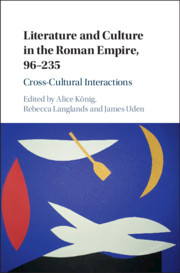Book contents
- Literature and Culture in the Roman Empire, 96–235
- Literature and Culture in the Roman Empire, 96–235
- Copyright page
- Contents
- Figures
- Contributors
- Preface
- Timeline
- Abbreviations
- Map
- Introduction
- Part I Refiguring Roman and Greek Interactions
- Chapter 1 Beyond Romans and Others
- Chapter 2 The Noise-Lovers
- Chapter 3 Plutarch and Roman Exemplary Ethics
- Chapter 4 Patronage, Cultural Difference and Literary Interactivity
- Chapter 5 The Romance of Republican History
- Chapter 6 Tactical Interactions
- Part II Imperial Infrastructure: Documents and Monuments
- Part III Cultural Translation and Transformation
- References
- Index
Chapter 2 - The Noise-Lovers
Cultures of Speech and Sound in Second-Century Rome
from Part I - Refiguring Roman and Greek Interactions
Published online by Cambridge University Press: 28 April 2020
- Literature and Culture in the Roman Empire, 96–235
- Literature and Culture in the Roman Empire, 96–235
- Copyright page
- Contents
- Figures
- Contributors
- Preface
- Timeline
- Abbreviations
- Map
- Introduction
- Part I Refiguring Roman and Greek Interactions
- Chapter 1 Beyond Romans and Others
- Chapter 2 The Noise-Lovers
- Chapter 3 Plutarch and Roman Exemplary Ethics
- Chapter 4 Patronage, Cultural Difference and Literary Interactivity
- Chapter 5 The Romance of Republican History
- Chapter 6 Tactical Interactions
- Part II Imperial Infrastructure: Documents and Monuments
- Part III Cultural Translation and Transformation
- References
- Index
Summary
This chapter provides an examination of an ideal shared across languages and cultures in the second century: the ideal of the ‘deliberate speaker’, who aims to reflect time, thought, and study in his speech, and who draws attention to his words quawords. Articulate and educated speech becomes a vital tool for creating and defending in-groups in this period. By contrast, orators and authors in both Latin and Greek condemn their opponents as producing mere noise. The ideal of the deliberate speaker is explored through the works of two very different contemporaries: the African-born Roman orator Fronto and the Syrian Christian apologist Tatian. Despite moving in very different circles, Fronto and Tatian both express their identity and authority through an expertise in words, in strikingly similar ways. The chapter ends with a call for scholars of the Roman Empire to create categories of analysis that move across different cultural and linguistic groups. If we do not, we risk merely replicating the parochialism and insularity of our sources.
Keywords
- Type
- Chapter
- Information
- Literature and Culture in the Roman Empire, 96–235Cross-Cultural Interactions, pp. 58 - 74Publisher: Cambridge University PressPrint publication year: 2020
- 1
- Cited by

